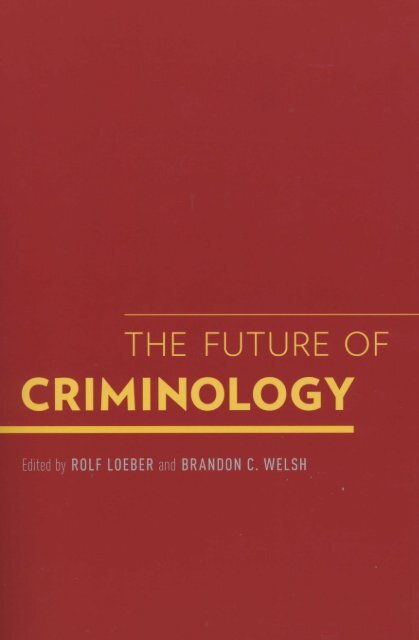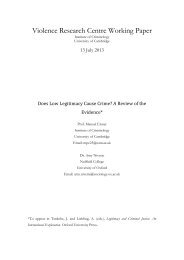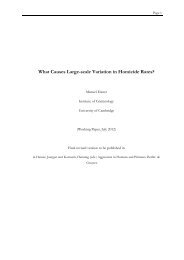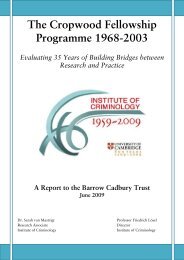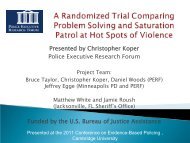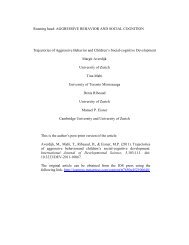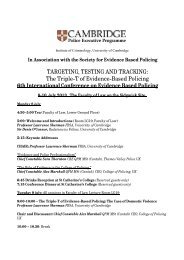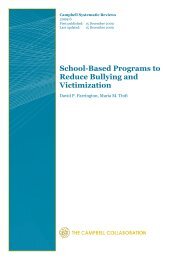The future of criminology
The future of criminology
The future of criminology
You also want an ePaper? Increase the reach of your titles
YUMPU automatically turns print PDFs into web optimized ePapers that Google loves.
OXTORD<br />
UNIVERSITY PRESS<br />
Oxford University Press, Inc., publishes works that further<br />
Oxford University's objective <strong>of</strong> excellence<br />
in research, scholarship, and education.<br />
Oxford New York<br />
Auckland Cape Town Dar es Salaam Hong Kong Karachi<br />
Kuala Lumpur Madrid Melbourne Mexico City Nairobi<br />
New Delhi Shanghai Taipei Toronto<br />
With <strong>of</strong>fices in<br />
Argentina Austria Brazil Chile Czech Republic France Greece<br />
Guatemala Hungary Italy Japan Poland Portugal Singapore<br />
South Korea Switzerland Thailand Turkey Ukraine Vietnam<br />
Copyright © 2012 by Oxford University Press.<br />
Published by Oxford University Press, Inc.<br />
198 Madison Avenue, New York, New York 10016<br />
www.oup.com<br />
Oxford is a registered trademark <strong>of</strong> Oxford University Press<br />
All rights reserved. No part <strong>of</strong> this publication may be reproduced,<br />
stored in a retrieval system, or transmitted, in any form or by any means,<br />
electronic, mechanical, photocopying, recording, or otherwise,<br />
without the prior permission <strong>of</strong> Oxford University Press.<br />
Library <strong>of</strong> Congress Cataloging-in-Publication Data<br />
<strong>The</strong> <strong>future</strong> <strong>of</strong> <strong>criminology</strong> / edited by Rolf Loeber and Brandon C. Welsh.<br />
p. cm.<br />
Includes bibliographical references and index.<br />
ISBN 978-0-19-991793-8; ISBN 978-0-19-991795-2 (pbk.)<br />
i. Criminology. 2. Crime prevention.<br />
I. Loeber, Rolf. II. Welsh, Brandon, 1969-<br />
HV6025.F88 2012<br />
364—dc23 2011042957<br />
135798642<br />
Printed in the United States <strong>of</strong> America<br />
on acid-free paper
{10}<br />
Risk and Protective Factors in the Assessment <strong>of</strong><br />
School Bullies and Victims<br />
Maria M. Tt<strong>of</strong>i and Peter K. Smith<br />
David Farrington has made many outstanding contributions to knowledge, especially<br />
on the development <strong>of</strong> <strong>of</strong>fending and antisocial behavior, and on the effectiveness<br />
<strong>of</strong> interventions in reducing <strong>of</strong>fending and antisocial behavior. Within<br />
this framework, one may highlight his research on intragenerational and intergenerational<br />
continuity <strong>of</strong> school bullying as well as his contributions regarding<br />
the effectiveness <strong>of</strong> bullying prevention programs. His scholarly articles are especially<br />
pioneering, noteworthy, and influential. In his elegant 1993 paper in Crime<br />
and Justice, David Farrington <strong>of</strong>fered a comprehensive and exhaustive review that<br />
initiated his current position as one <strong>of</strong> the leading world experts in the area <strong>of</strong><br />
school bullying. An empirical part, based on longitudinal analyses from the Cambridge<br />
Study in Delinquent Development, complemented the review part <strong>of</strong> the<br />
paper and emphasized the importance <strong>of</strong> incorporating longitudinal data in<br />
examining this form <strong>of</strong> externalizing behavior. Many <strong>of</strong> the suggestions for <strong>future</strong><br />
research put forward in his 1993 manuscript have been addressed to date, but<br />
many others (especially those concerning longitudinal research) have not been<br />
fully addressed so far.<br />
In 2011, David Farrington played a crucial role in initiating new longitudinal<br />
data analyses from major prospective longitudinal studies across the world. This<br />
was a major task leading into two special issues (in Criminal Behaviour and Mental<br />
Health and in the Journal <strong>of</strong> Aggression, Conflict and Peace Research)1 regarding<br />
the long-term adverse consequences (i.e., internalizing and externalizing problems)<br />
<strong>of</strong> school bullying. All the above considered, it is highly appropriate for us<br />
to focus in this chapter on the importance <strong>of</strong> (a) incorporating prospective longitudinal<br />
data in examining school bullying and (b) investigating risk and protective<br />
factors for the assessment <strong>of</strong> school bullies and victims. Implications arising<br />
from these new directions <strong>of</strong> research for <strong>future</strong> antibullying initiatives are<br />
discussed.


